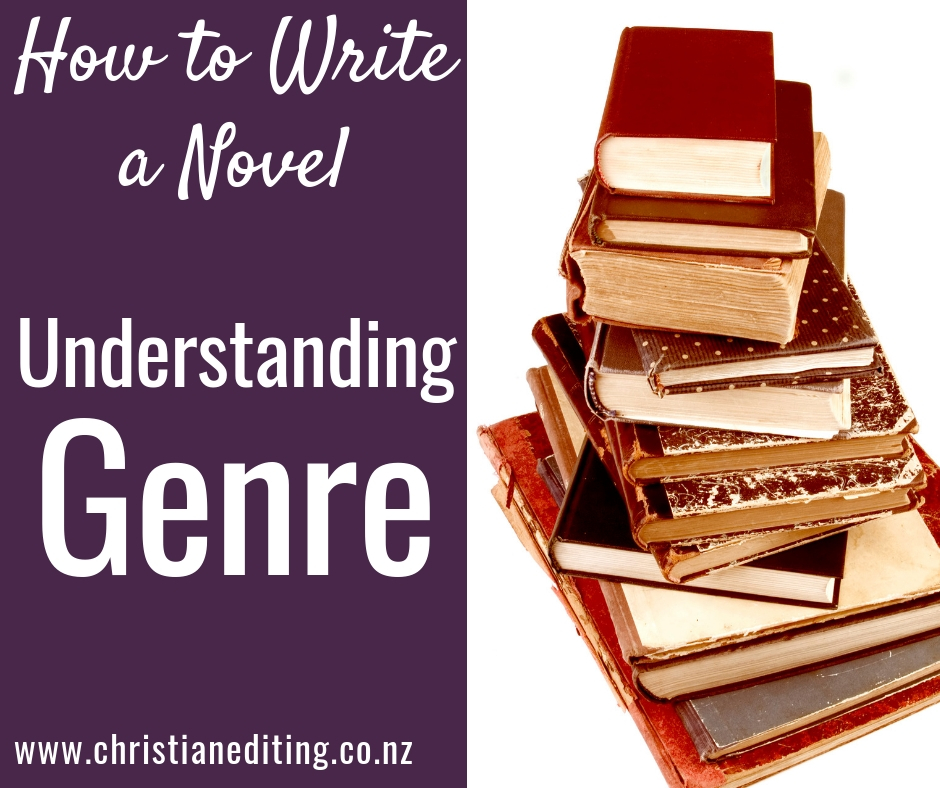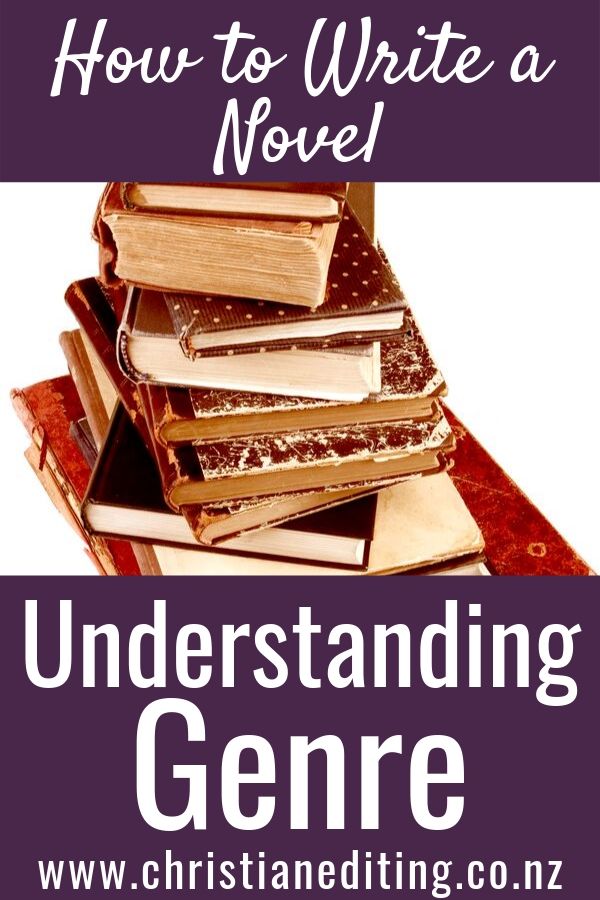As a reviewer and editor, I read a lot of fiction, mostly Christian fiction. I see a lot of the same mistakes over and over, especially from first-time authors. One of those issues is genre.
Click here to sign up for my newsletter to learn what mistakes I see most often—and how to fix them.
What's the most important aspect of writing a novel? Understanding genre. Here's what you need to know. #ChristianFiction #WritersLife Click To Tweet
I’ve written an entire series of posts on genre, plus additional posts attempting to define Christian fiction (attempting, because there is no industry-agreed definition). This post brings all my information on genre into one place.
First, why is genre important?
Genre underpins the publishing world:
- Publishers publish by genre.
- Agents acquire by genre.
- Bookstores organise by genre.
- Readers purchase by genre.
And readers review by genre. If a book doesn’t meet the expectations of the genre, you can expect low-star reviews with comments about not meeting expectations. Angela Hunt, author of over 100 books, says:
Before you begin writing your novel, you should know what genre you are writing in. The number one mistake of beginning writers in this area is to not consider genre at all.
Understanding your genre will:
- Inform some of your writing decisions, including the most appropriate point of view, the number of viewpoint characters, tense, voice, style and word count.
- Help ensure you don’t stray off-topic as you write.
- Inform the length of your story.
- Influence your cover design.
- Guide your marketing efforts.
So what do you need to know?
Here are my six steps to meeting the expectations of genre readers:
- Know the age group your book is targeting.
- Know whether you’re targeting the Christian or general market.
- Understand the genre and subgenre you’re writing.
- Understand historical vs. contemporary.
- Get your word count right.
- Write in a series.
Step One: Know the age group your book is targeting.
The standard industry age categorisations are:
- Picture Books: Under 5 years old.
- Early Reader: 5–7 years old.
- Middle Grade: 8-12 years old.
- Young Adult: 13-18 years old.
- New Adult: 18–25 years old.
- Adult: Over 18 years.
Are you clear which age group your book is targeting?
Step Two: Know whether you’re targeting the Christian or general market
General market booksellers in the US are typically members of the American Booksellers Association (ABA). Christian booksellers were typically members of what was the Christian Booksellers Association (CBA), which has now been supplanted by the Christian Retailers Association (CRA). Click here to find out more.
CBA and CRA booksellers sell Christian books, but how do we define a Christian book? That’s relatively easy when it comes to nonfiction:
- Bible studies and devotional books are clearly Christian in nature.
- Memoirs or biographies of Christians are clearly Christian.
- There are also a huge number of Christians writing in the self-help genre, ranging from obviously Christian topics such as improving your prayer life, to less obvious subjects such as diet.
The common thread is that Christian nonfiction uses the Bible as a reference or influence.
It’s less easy when it comes to Christian fiction. People often attempt to define Christian fiction by the author or publisher or some other criteria, but those don’t always fit. Click here to find out more.
So what is Christian fiction? Various authors have tried to define it. Francine Rivers says:
If you pull out the Christian thread from the plot and the plot unravels, it’s Christian fiction.
Anything a Christian writes must reflect the truth of God’s account. If as a Christian we don’t write from a biblical worldview, we’re not portraying reality as it is.
Penelope J Stokes defines Christian fiction as fiction that tells the truth.
Terry Burns and Linda Yezak divide Christian fiction into four categories:
- Fiction written for believers
- Fiction written for unbelievers
- Fiction written for backsliders
- Fiction written for seekers
Chawna Schroeder believes Christian fiction follows the guidelines of Philippians 4:8.
Finally, brothers, whatever is true, whatever is noble, whatever is right, whatever is pure, whatever is lovely, whatever is admirable—if anything is excellent or praiseworthy—think about such things.
Other authors have different views. Click here to check them out.
Are you targeting the Christian market, the general market, or seeking to sell a crossover title?
Step Three: Understand what genre and subgenre you’re writing
Amazon has hundreds of book categories for fiction. They fall into three broad market categories:
Romance: developing a romantic relationship between two people, with a happy-ever-after ending. Click here to find out more.
Action: mystery, suspense or thrillers, where the primary focus is on the action, not the character relationships. Click here to find out more.
Worldbuilder: genres such as science fiction, fantasy, dystopian and paranormal, set in another world. Click here to find out more.
What is your broad genre?
There are dozens—perhaps hundreds—of subgenres. Over the last three years, many of these have been discussed at Australasian Christian Writers. Click here for a roundup of the genre posts.
Each genre has its own structure and tropes, and you’ll need to know the tropes (and know how to twist them). Click here to check out a definition of trope, and ten common romance tropes, and click here to check out twelve more romance tropes (note: these lists are by no means exhaustive).
What tropes are you using?
It can be difficult to work out what genre you’re writing if you write the book first, then try and fit it to a genre. This is why experts recommend starting with a genre, and writing to the expectations of that genre. (And the best way to learn the genre expectations is to read widely, starting with some of the top-selling books in your chosen genre).
Step Four: When Is Your Novel Set?
Novels can be set in the past, present, or future (although that’s mostly Worldbuilding novels). Note that what we now consider historical classics (e.g. Jane Austen or Charles Dickens) were contemporary novels when they were published.
Historical fiction presents a particular challenge, as historical fiction requires research. Getting your facts right is important. There will always be a reader who has read everything about this period and who will point out all the inaccuracies and anachronisms in their review. Click here to read more.
One peculiarity of genre is that novels set in the recent past may be classified as contemporary fiction rather than historical. Click here to find out when historical fiction becomes contemporary.
When is your novel set?
Step Five: How Long is Your Novel?
- Short story: under 7,500
- Novelette: between 7,500 and 17,500
- Novella: between 17,500 and 40,000
- Novel: over 40,000
But there are long novels and short novels: American Christian Fiction Writers classify a novella as between 15,000 and 45,000 words, and a short novel as 45,000 to 70,000 words.
The desired word count for novels varies depending on genre. Click here to find out more.
Word count also depends on the target age: picture books tend to be 500 words. Middle Grade books average 35,000 words, but can be higher or lower depending on whether you’re targeting older or younger Middle Grade readers.
I’ve also been asked how many chapters a novel should have. That’s less important than the overall word count, and ensuring each scene and chapter moves the story forward. Click here to find out more.
How long is your novel, and is that consistent with reader expectations in your genre?
Step Six: Is Your Novel Part of a Series?
My personal opinion is that, where possible, authors should plan to write a series of books. This has advantages in both the writing and the marketing. Click here to find out more.




One comment